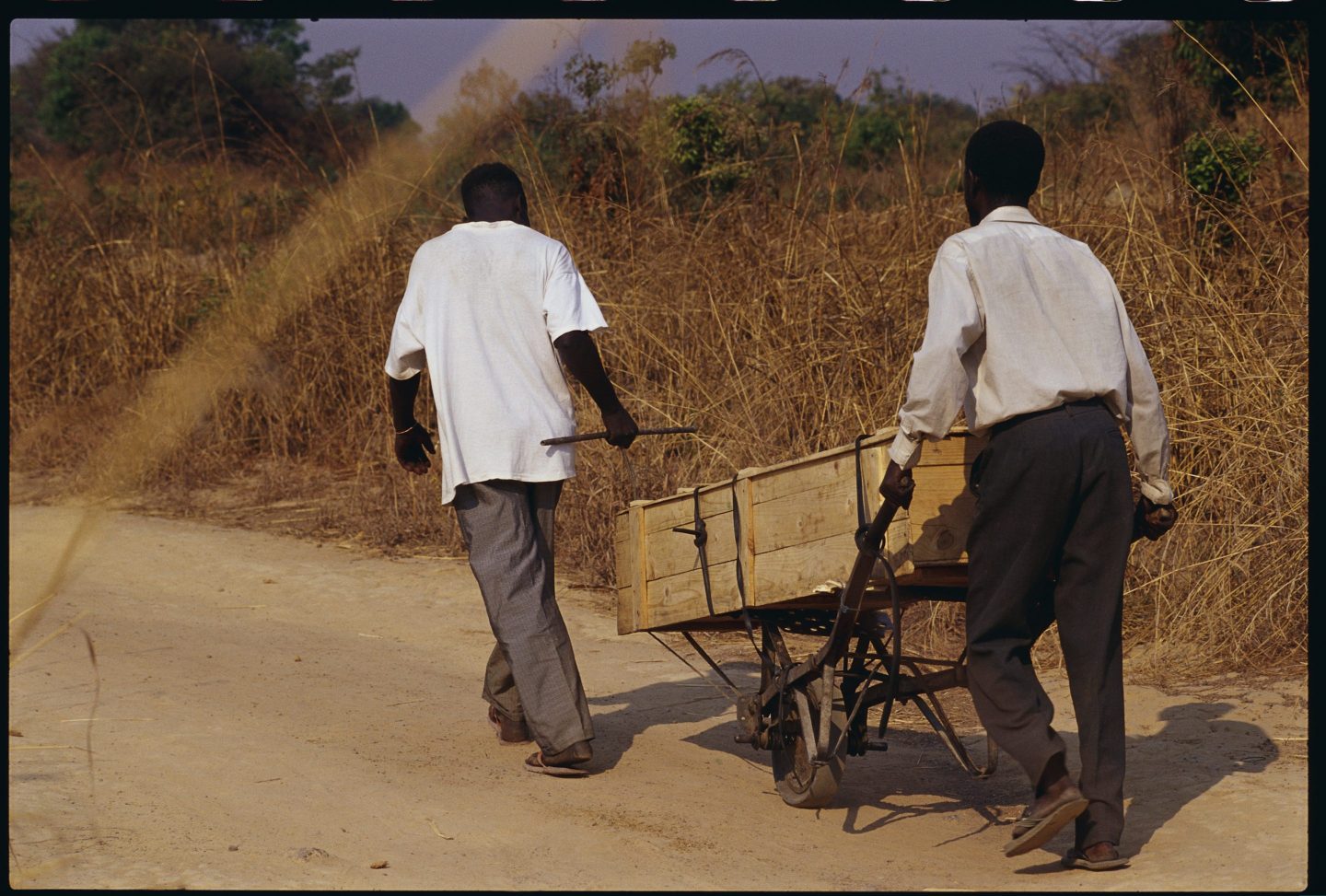
刚果民主共和国玉米价格暴涨,于是邻国赞比亚的人们非法走私这种主食来赚取暴利,而政府打压此类活动导致了一些人采取更加巧妙的隐藏方式——有些人甚至使用棺材来走私。
据赞比亚的国家广播公司报道,走私者一直将玉米粉藏在碎石、沙子和棺材中。他们甚至还把玉米藏在糖袋里。虽然通常持续到5月的粮食紧张季节经常会引发邻国的高需求,但今年的情况尤为严重。
赞比亚是南部非洲最大的粮食生产国之一,受到俄罗斯与乌克兰冲突的影响,该地区其他国家的化肥供应受到阻碍,但赞比亚在去年仍然实现了玉米盈余。
根据饥荒早期预警系统网络(Famine Early Warning Systems Network)的数据,与前年同期相比,用水和玉米混合制成的一种叫做恩希玛(nshima)的粥在马拉维的价格在2月翻了一番多。4月下旬,联合国(United Nations)支持的奥卡皮广播电台(Radio Okapi)报道称,在刚果的卢本巴希,家庭最常购买的25公斤袋装价格在最近几天猛涨了80%,达到9万法郎(44美元)。
这为赞比亚的非法贸易商创造了一个有利可图的套利机会,因为同一袋玉米粉在那里只需要10美元。这也给赞比亚政府带来了问题,政府已经部署了安全部队来遏制造成局部短缺的走私活动。空军正在考虑进行空中巡逻。
赞比亚最大的超市连锁店Shoprite Zambia是限制顾客购买玉米粉数量的零售商之一。
限额两袋
“在当前的短缺危机中,我们被政府委托补贴粮食储备局(Food Reserve Agency)的玉米粉,以便我们的顾客从价格中受益。”Shoprite控股有限公司(Shoprite Holdings Ltd.)当地分公司的总经理查尔斯·博塔在4月中旬回复问题的电子邮件中说,“因此,在这次暂时的短缺期间,我们不能允许一个人购买超过一袋或两袋玉米粉。”
尽管赞比亚在过去三个季度中玉米产量过剩,但该国农业部的部长鲁本·菲里在赞比亚国家广播公司(Zambia National Broadcasting Corporation)的评论中表示,直到未来几周的下一次收获,该国目前剩下的玉米仅够满足自身需求。政府已经停止发放出口许可证。(财富中文网)
——迈克尔·J·卡瓦纳(Michael J. Kavanagh)对本文亦有贡献。
译者:中慧言-项曦莹
刚果民主共和国玉米价格暴涨,于是邻国赞比亚的人们非法走私这种主食来赚取暴利,而政府打压此类活动导致了一些人采取更加巧妙的隐藏方式——有些人甚至使用棺材来走私。
据赞比亚的国家广播公司报道,走私者一直将玉米粉藏在碎石、沙子和棺材中。他们甚至还把玉米藏在糖袋里。虽然通常持续到5月的粮食紧张季节经常会引发邻国的高需求,但今年的情况尤为严重。
赞比亚是南部非洲最大的粮食生产国之一,受到俄罗斯与乌克兰冲突的影响,该地区其他国家的化肥供应受到阻碍,但赞比亚在去年仍然实现了玉米盈余。
根据饥荒早期预警系统网络(Famine Early Warning Systems Network)的数据,与前年同期相比,用水和玉米混合制成的一种叫做恩希玛(nshima)的粥在马拉维的价格在2月翻了一番多。4月下旬,联合国(United Nations)支持的奥卡皮广播电台(Radio Okapi)报道称,在刚果的卢本巴希,家庭最常购买的25公斤袋装价格在最近几天猛涨了80%,达到9万法郎(44美元)。
这为赞比亚的非法贸易商创造了一个有利可图的套利机会,因为同一袋玉米粉在那里只需要10美元。这也给赞比亚政府带来了问题,政府已经部署了安全部队来遏制造成局部短缺的走私活动。空军正在考虑进行空中巡逻。
赞比亚最大的超市连锁店Shoprite Zambia是限制顾客购买玉米粉数量的零售商之一。
限额两袋
“在当前的短缺危机中,我们被政府委托补贴粮食储备局(Food Reserve Agency)的玉米粉,以便我们的顾客从价格中受益。”Shoprite控股有限公司(Shoprite Holdings Ltd.)当地分公司的总经理查尔斯·博塔在4月中旬回复问题的电子邮件中说,“因此,在这次暂时的短缺期间,我们不能允许一个人购买超过一袋或两袋玉米粉。”
尽管赞比亚在过去三个季度中玉米产量过剩,但该国农业部的部长鲁本·菲里在赞比亚国家广播公司(Zambia National Broadcasting Corporation)的评论中表示,直到未来几周的下一次收获,该国目前剩下的玉米仅够满足自身需求。政府已经停止发放出口许可证。(财富中文网)
——迈克尔·J·卡瓦纳(Michael J. Kavanagh)对本文亦有贡献。
译者:中慧言-项曦莹
Surging corn prices in the Democratic Republic of Congo have created a lucrative trade for people to smuggle the staple food out of neighboring Zambia, and a clampdown is causing creative concealment strategies — with some even using coffins.
Smugglers have been hiding corn meal among crushed stones, sand and caskets, according to a report by Zambia’s state broadcaster. They’ve even hidden corn in bags of sugar. While the lean season that usually runs into May often comes with high demand from neighboring nations, this year it’s been particularly severe.
Zambia is one of southern Africa’s biggest food producers and managed a corn surplus last year despite the impact of Russia’s war in Ukraine on the supply of fertilizers that hobbled others in the region.
Prices for the crop that’s mixed with water to make a porridge called nshima has surged in the region — in Malawi, it was more than double in February compared with a year earlier, according to data from the Famine Early Warning Systems Network, known as FEWS Net. The cost of a 25-kilogram bag most commonly bought by families jumped as much as 80% in recent days to 90,000 francs ($44) in Lubumbashi in Congo, United Nations-backed Radio Okapi reported in late April.
That’s created a lucrative arbitrage opportunity for illicit traders in Zambia, where the same bag costs about $10. It’s also created a problem for Zambia’s government, which has deployed security personnel to curb the smuggling that’s created localized shortages. The air force was considering aerial patrols.
Shoprite Zambia, the nation’s biggest supermarket chain, is among retailers that have limited the amount of corn meal customers can buy.
Two Bags
“In the current shortage crisis, we have been entrusted with subsidized Food Reserve Agency maize meal by government so that our customers can benefit from the price,” Charles Bota, the general manager at the local unit of Shoprite Holdings Ltd., said in an emailed response to questions in mid-April. “We therefore cannot allow that a person buys more than one or two bags for this reason in the time of this temporary shortage.”
While Zambia produced surpluses for the past three seasons, the nation only has enough corn remaining to meet its own demand until the next harvest becomes available in the coming weeks, Agriculture Minister Reuben Phiri said in comments broadcast on ZNBC. The government has stopped issuing export licenses.
–With assistance from Michael J. Kavanagh.






